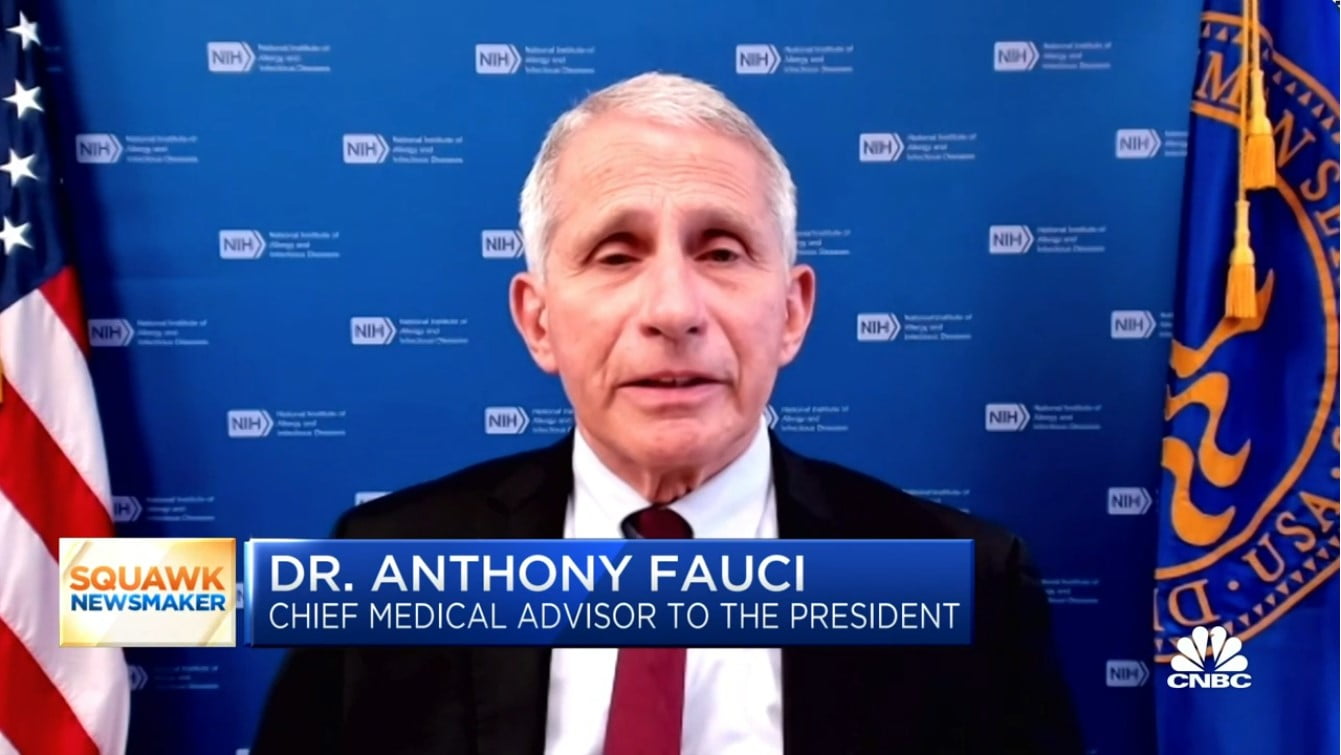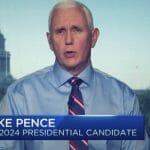Following is the unofficial transcript of a CNBC interview with National Institute of Allergy and Infectious Diseases Director & Chief Medical Advisor to President Biden Dr. Anthony Fauci on CNBC’s “Squawk Box” (M-F, 6AM-9AM ET) today, Tuesday, July 13th. Following is a link to video on CNBC.com:
Q2 2021 hedge fund letters, conferences and more
Dr. Anthony Fauci On The Need For Covid Boosters, The Meeting With Pfizer Executives
BECKY QUICK: In the meantime, US officials met with Pfizer executives yesterday. The big focus, whether or not fully vaccinated people will need the booster shot. Dr. Fauci was a part of that meeting and he joins us this morning. He’s the Chief Medical Advisor to the President and Dr. Fauci, thank you very much for being with us today. I have a lot of questions and we're hoping you can sort through some of this with us. First of all, what happened at the Pfizer meeting yesterday? What was the internal data that they showed and did it get you to the point where you think, okay, Americans may eventually need boosters.
DR. ANTHONY FAUCI: Well it was fundamentally a courtesy meeting. They had made an announcement a day or two before regarding some data from Israel as well as data that they had collected. They wanted to share it with us because there was obviously a lot of attention publicly to that so it was a meeting a courteous meeting where they, we exchanged information. It certainly was not anything even approximating a decisional meeting at all. Their data, as important as it will be and is likely is, is really one part of a very larger puzzle of data as it were, some of which a lot of which will be coming from our own CDC when they look at more than 20 cohorts that they're following to ask and answer the same question and that is what is the durability of the protective response. We know for sure that these vaccines are highly, highly effective in protecting you and quite safe. The real question that is being examined right now is what is the durability of that protection, does it wane off and if so, how soon. And if you do do a boost, how high do you get the response up? Those we’ll all discuss but again as I mentioned, there was nothing that came even close to any decision. It was really mostly a courtesy meeting briefing us on their data.
QUICK: Yeah, I wouldn't expect any decisions to be made at this point but it would be interesting to know if the data influenced you. What do you see in terms of the effectiveness over time? Does it, does it drop dramatically over two months, four months, six months?
DR. FAUCI: Well, I can't tell you much about their own data because it's still at the level that we agreed upon confidentiality. I don't think it's going to surprise anybody the data that is public now is the Israeli data which they've made public. And as you can see from the data, there seem to have been a sharp drop in protection against just infection, asymptomatic infection, after a certain number of months. What has held firm is the very good protection against severe disease that might lead to hospitalization.
QUICK: That's great news and I'll tell you what we discussed with the doctor who we had on the show yesterday. I mean I, I've been fully vaccinated, I feel very comfortable about myself, what I feel less confident in is the idea of whether or not I can pass this on to my children who are too young to be vaccinated at this point. The Delta variant if something else were to come through how confident do you feel that I either won't pass this on to my children who haven't been vaccinated or to you know parents who are in a position of being medically compromised? What, what can you tell us, or anybody else who has those same concerns right now?
DR. FAUCI: Well, they're understandable concerns. They're quite reasonable, we're being asked that a lot. And again, we are collecting data now that will allow us to hopefully, in a more confident way, answer your question. I can tell you what data we have that does show that if a young, otherwise healthy person like yourself is fully vaccinated even if you do get a breakthrough infection, it likely will be either with no symptoms or minimal symptoms. One of the studies showed that if you examine the level of virus in the nasal pharynx of a vaccinated person who has a breakthrough infection and doesn't have any symptoms and compare that to the level of virus in the nasal pharynx of an unvaccinated person who gets infected and has no symptoms, the level of virus in the nasal pharynx of the vaccinated person is considerably lower than that in the unvaccinated person which just would strongly suggest that the likelihood of your passing it on to anyone else is much, much, much less than if you were not vaccinated. Now the study that does need to be done is the actual clinical observation study to determine the efficiency or not of transmission and those studies are ongoing now. So even though we have a suggestion of what the answer is, we haven't definitively shown it yet but we will have that data within a reasonable period of time.
ANDREW ROSS SORKIN: Dr. Fauci. Hey it's Andrew. A behavioral science question of sorts, how concerned are you and how concerned is the administration effectively that engaging in a conversation about boosters makes it even less attractive for those who have yet to take the first shot of the vaccine that they won't want to take it at all because they're going to say that either it is not effective or they're going to say, I'm not only in for one shot or two, I may be in for three and maybe I'm going to be even in for more overtime.
DR. FAUCI: Okay, so that's really a great question and it allows me to make a point that we really need to clarify. When you're talking about a booster, namely a third shot in a two shot regimen what we're discussing now or a booster following a single shot of J&J, this has absolutely nothing to do with the effectiveness of the vaccine. These vaccines are highly, highly effective both in the clinical trial and in the real-world effectiveness studies. Let me give you a cogent example, 99.5% of people who die of COVID are unvaccinated. Only 0.5% of those who die are vaccinated. So, it isn't a question of whether the vaccine is effective or not. It has to do with the durability of the protection. So there really is nothing wrong if in fact and I don't know whether it's going to happen or not but if there will be a necessity to maintain the high level of effectiveness by having a booster sometime down the pipe that that be that a year or two or what have you, be that selectively in elderly or in people who have underlying condition, there's nothing intrinsically wrong with that. We do that with vaccines all the time. When you look at the regimen of the vaccines that you and I got when we were children, mainly the measles, mumps, rubella etc., you get a vaccine, you get a second shot and then a few years later you get a third shot. So, there's nothing new or mysterious about the possibility or even the likelihood that in order to maintain the durability of the protection that you might need another shot. We've got to make sure we clarify that with people. It has nothing to do whether or not it's effective. We know it's highly effective.
SORKIN: Dr. Fauci, I appreciate that point. The, the reason I asked the question is because there seems to have been some frustration inside the administration about Pfizer coming out with its announcement anticipating a booster and from the reporting that I've done, I gather that the concern seems to be that look, we haven't even gotten enough people vaccinated the first time and conversations about a booster are not going to help that conversation. And there's a question about should we just, should we not engage with that discussion? Should we, do we need to be straighter with the public that maybe a booster is going to be in the offing, and how you think about the push pull because I know that part of this is a behavioral science issue. It became an issue when it came to masking.
DR. FAUCI: Right. You know you make again excellent points so let me give you my perspective on it. The discussion about boosters is really an appropriate preparation on the part of the companies together with the NIH and the CDC and others in being prepared in the eventuality that you might need a boost. But when you translate that into, we will need a boost, everyone's going to get a boost. That is not appropriate, it's not appropriate for the reasons that you just mentioned is that we still haven't vaccinated enough people in the primary part of this. We only have 48% of the total population vaccinated. We have about 68% or so of adults having received at least one dose. If you think this is an issue in this country, take a look at what the WHO is faced with when they have to worry about the entire world and know that there are some countries when there's less than a couple of percent of the population being vaccinated. And this is a global pandemic which requires a global response. So, you're absolutely right, here we are talking about the possibility of a third shot boost and a major component of the world has never even received a single shot. We've got to make sure we take those things into consideration.
QUICK: I want to ask you about some other issues but just as a follow up on that, does that get you into the ethics of whether Americans are going to look greedy if they get booster shots which then all of a sudden takes me back to the idea we need to share we understand this as a global problem. And does that guide us in whether or not we decide booster shots are necessary early on?
DR. FAUCI: You know, I think you can do both in the sense of consider the possibility and maybe even implement boosters at the same time that you make sure we do everything we can to get doses to people in parts of the world that don't have ready access to that and if you look at what the United States is doing, we're doing a lot I mean, we now have pledged 500 million doses in addition to the 80 million doses that we said we would be distributing. We're already distributing a considerable amount of that. We have $4 billion that we put into the COVAX, the WHO and other organizations that are going to be putting the resources into getting vaccines so we are doing both. We clearly are making an effort, we all need to do more. The entire world, that at least the developed world that the world that has the resources, needs to do more to make sure that vaccines get distributed equitably throughout the world and you're right, that is an ethical issue.
QUICK: At the same time, there are questions about different types of vaccines and whether they're all created equal. Johnson & Johnson and AstraZeneca, along with the University of Oxford, are now conducting some of these early stage research ideas into whether or not, if they modify things, if they modify their COVID-19 vaccines, whether they could either reduce or eliminate the risk of blood clots that comes with that. And then the FDA just attached this warning of that rare nerve syndrome to the J&J vaccine as well. Those seem to be the vaccines where there are many more questions that are being asked versus the mRNA vaccines like Pfizer and Moderna, is that an accurate description?
DR. FAUCI: Well, I mean obviously there are always and we've seen it already, unusual and even rare adverse events associated with vaccines, with all the vaccines you'll see that. Every time it's been examined, the conclusion has come firmly that the benefit of the vaccine far outweighs any risk of an adverse event. The vaccines that have been given emergency use authorization in the United States are all highly effective vaccines and I think we can say that with a degree of confidence.
QUICK: How long do you think it will be before there is full authorization for those vaccines which I ask in part because a lot of workplaces are reluctant to require vaccinations when those vaccines are still being used under the emergency use authorization.
DR. FAUCI: You know, a couple of comments about that, I don't know when. I mean I can't get ahead of the FDA. They do their thing they dot all the i's and cross all the t's about that. But the one thing that people should realize that even though we are still under an emergency use authorization, it's a bit different than other emergency use authorizations which usually are granted with not nearly as much positive data as we have for these products so all EUA's are not created equal. So when we say it's still not fully approved, the data are about as good as it gets. So as I've said multiple times and I have no hesitation to say it now, I would be astounded if these vaccines, namely the mRNA and the J&J didn't get full approval. If you look at the United States which mostly are the mRNA vaccines, you know, we've given hundreds of millions of doses to people and the efficacy or effectiveness in the real world is unquestioned. So we're going to get a full approval. The question is, it's just going to take a little bit more time.
SORKIN: Dr. Fauci, to the extent that business leaders are watching you this morning on this very program and are considering whether they should mandate the vaccine and I'm talking about some of the largest companies in the country that you have an opportunity to speak to whether you think a Walmart, an Amazon, a Federal Express should ultimately mandate the vaccine but mandate it before the emergency use turns into a regular use. There's, there's still questions a lot of lawyers are giving lots of advice to, to these leaders about whether they'll have liability or not but if you could advise them, what would you tell them?
DR. FAUCI: You know, I can just tell you what I have said before, and I think that given the fact that there is a reluctance among some in the United States to take what is unquestionably a lifesaving vaccine and if we really do want to get back to normal, or at least approximating normal in this country, it's important to get as many people vaccinated as we possibly can. I would be in favor and I'm not saying anything new I've said it before, in local entities getting mandates for vaccines. It's not going to happen centrally from the federal government but I believe that local mandates be that at universities, at colleges, as businesses and cruise lines or whatever I'm not want to, you know, pointing out at any individual one but in those general categories I believe that if we do have local mandates, we will get many more people vaccinated and that will be to the benefit of the entire country as well as to the individuals who are being vaccinated and protected.
QUICK: Dr. Fauci, we want to thank you for your time today and for being with us. We appreciate these important updates. Thank you.
DR. FAUCI: My pleasure. Good to be with you.













